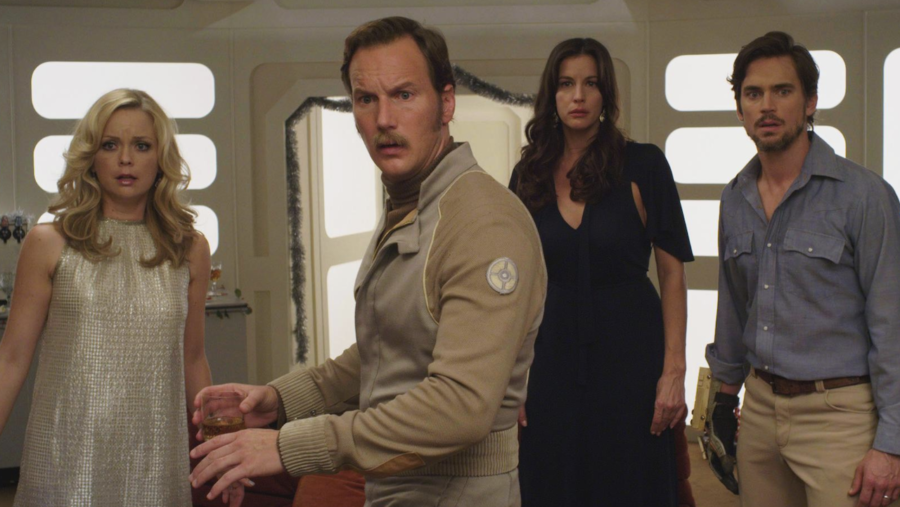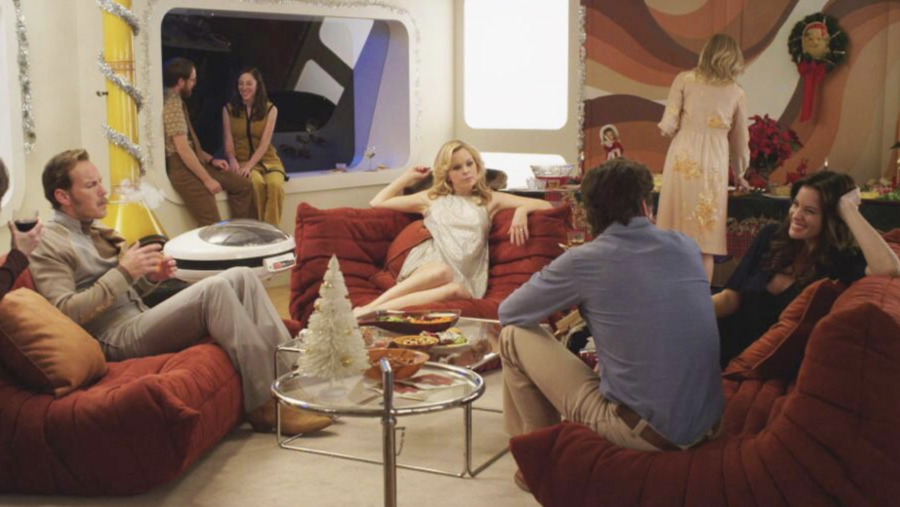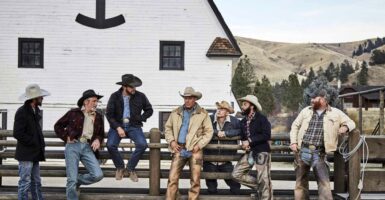Space Station 76 Movie Review
Back to the past of the future.

To illustrate just how much I loved the “1970s space opera” parody Space Station 76, I’ll be writing this review while simultaneously smoking in front of a child and styling my mustache.
For his feature debut, comic actor Jack Plotnick is almost too inspired, creating a movie that is so cemented into its 1970s setting that the spoof vibe dissipates into genuine melodrama, like a made-for-TV version of Dr. Strangelove. While that beaded curtain of a line may be too much for some viewers to step over, I wish I could have floated in space with this excellent Space Station 76 cast forever.
Hanging out there in the blackness of the universe is Space Station 76, a refueling outpost and living quarters headed by the repressed and antisocial Captain Glenn (Patrick Wilson), a man for whom appearing unguarded would be uncivilized.
Space Station 76’s mechanic, Ted (Matt Bomer), is just as handy with a lighter and rolling papers as he is with fixing up machine parts. He’s in a mildly loveless marriage with Misty (Marisa Coughlan), who takes valium-popping hyper-feminism to a new, aloof level, and their daughter Sunshine (Kylie Rogers) is a bright young girl who doesn’t quite fit in with these adult caricatures.
Jerry O’Connell gets his sleaze on as a pussy-hound named Steve, who is married to Donna (Kali Rocha), whose own self-involvement makes her impervious to the signs of Steve’s infidelity.
The Space Station 76 story begins just after Glenn’s second banana has left the space station (for mysterious reasons) and another is arriving. It’s immediately obvious that Glenn is uncomfortable with Jessica (Liv Tyler), a more than capable replacement who just doesn’t fit into Glenn’s worldview, which generally focuses on women not being so empowered.
But don’t get me wrong, Space Station 76‘s Patrick Wilson isn’t cartoonishly berating his crew or the gender at large; he’s far more realistic in his misogyny, complimenting Jessica’s ideas while dismissing them in the same breath. It’s played to match the gender imbalance stereotype of yesteryear, but the subdued approach makes this (and plenty of the other humorous reference points) come off as oddly modern.

Space Station 76 feels a lot like an extended TV pilot, which isn’t to say it doesn’t work as a film; it just doesn’t have many moving parts, choosing to highlight and overextend all of the surface details. When there are so many details to exploit, that’s hardly a bad thing.
The decor of the Space Station 76 ship, from the wood paneling to the swirly wall patterns, is almost a character unto itself, sharing the screen with stellar costumes and retro special effects. Ted has a robo-hand that seriously could have been put together in five minutes at a junkyard, but it’s played several times for laughs because the low-tech goofiness works.
Speaking of robotic parts, some of Space Station 76‘s crowning achievements are Dr. Bot and the myriad other robotic ship voices and computer prompts that are sprinkled throughout the film. Dr. Bot is a psychiatrist whose methods of diagnosis involve keyword voice commands and upping a prescription’s strength.
It’s again the lo-fi approach that makes these things work, as all of the choppy-voiced A.I. programs sound exactly like the first alien and robot voices that children learn, along the lines of “Take. Me. To. Your. Leader.”
And the exaggerations are there, like “Docking Bay Door Opening” being voiced aloud as the docking bay door opens. It’s not exactly pointing at what people of the 1950s and 1960s thought the future was going to be like, but it’s politely tittering and saying, “We’re all capable of daft thoughts sometimes.”
Many other recognizably 1970s references are made in Space Station 76, such as the rampant amounts of smoking on board the space station, and there are quite a few times where smoking in front of children is used for jokes.
A View-Master makes an appearance. The soundtrack is pretty incredible, with songs like “Utopia Theme” making the movie feel like it’s being played out on a bigger landscape. Or spacescape, as it were. But even beyond all of the kitschy nods and washed-out colors, the most 1970s aspect of Space Station 76 is its ability to expand beyond its parody descriptor to occasionally become something more experimental.
Seriously, the ending of this flick feels like an entirely different movie, and I can’t tell how intentionally emotional some of those deeper and darker moments were meant to be. It’s to be championed rather than decried, however.
A film whose cult status is already chiseled out, Space Station 76 feels like something we haven’t quite seen before, though films like Wet Hot American Summer and Black Dynamite managed to pay homage to their target genres while still telling an interesting story in and of themselves.
I’m not so sure that Plotnick and his four Space Station 76 co-writers actually told much of a story here, but the talented cast make these characters more familiar to me than they would have been in any other cinematic situation.
Plus, without Space Station 76, we might not have gotten the most uncomfortable scene in Patrick Wilson’s career, and this is the guy who had a sex scene as Watchmen‘s Nite Owl, and also preyed upon a young girl in Hard Candy.












